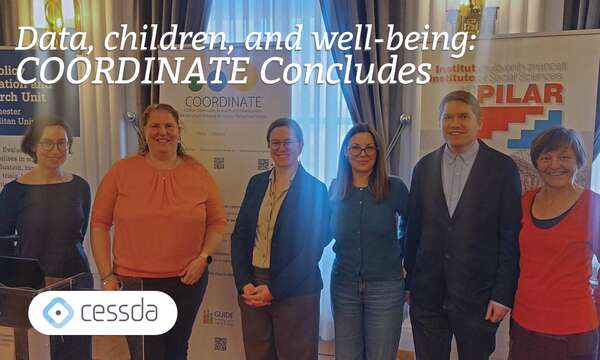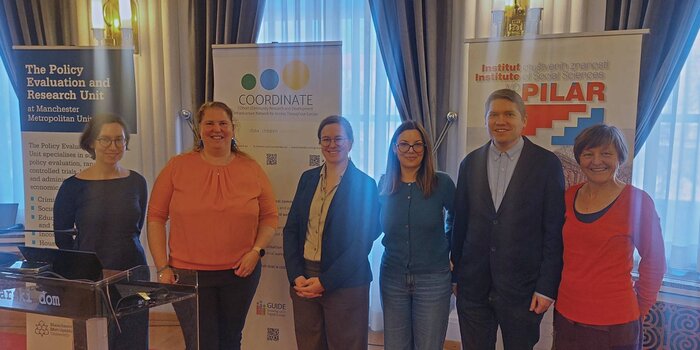
COORDINATE Concludes Successfully
After four years of dedicated work, COORDINATE officially reached its successful conclusion in March 2025. This EU-funded research project aimed to improve the availability of robust and suitable data for the monitoring and evaluation of child wellbeing in Europe.
Data. Children. Well-being. The three keywords behind COORDINATE draw attention to the need for harmonised and accessible data focusing on children’s wellbeing. COORDINATE ensured that high quality survey data can inform policies that directly affect children’s lives, while a longitudinal, cross-national birth cohort survey addressing this topic is being set up to fill the current gap in the European research landscape (GUIDE).
In CESSDA’s team, the project involved a collaborative effort from our Service Providers in Croatia (CROSSDA), Finland (FSD) and Slovenia (ADP). GESIS (Germany) also participated as a beneficiary. CESSDA brought in expertise and experience on data documentation, data catalogues and the standards for data archiving and curation; and offered the possibility for synergy and a smooth integration in the existing EOSC and ESFRI landscape for GUIDE.
The research that COORDINATE completed, using a child-centric approach, continued the research initiated in the ‘Measuring Youth Well-Being’ (MyWEB) and the ‘European Cohort Development Project’ (ECDP) projects. Europe’s first cross-national accelerated birth cohort survey of child well-being, Growing Up in Digital Europe (GUIDE) is currently in its preparatory phase. The GUIDEPREP project further develops the research infrastructure (RI) necessary to implement the GUIDE birth cohort study. This preparatory work takes place across 2022 to 2025 to ready the RI for the full-scale piloting of the GUIDE in 2026 and the first full wave of data collection in 2027. Once operational, GUIDE will collect data about individual children growing up in Europe until those children are aged 24-years in approximately 2053.

CESSDA's COORDINATE team consisted of (from left to right) Ana Inkret (ADP), Irena Vipavc Brvar (ADP), Cecilé Guezennec (CESSDA MO), Panagiota Starida (CESSDA MO), Markus Tuominen (FSD), Marijana Glavica (CROSSDA), and Vedran Halamic (not pictured) (CROSSDA).
COORDINATE Data Portal
FSD and the CESSDA Main Office developed a virtual access platform to make existing data on child and youth well-being findable. As it is built on the CESSDA Data Catalogue (CDC) and the CESSDA metadata harvesting system, the Portal leverages CESSDA’s well-established, high quality services. It has now been folded into the CDC as a thematic view, which offers a range of long-term benefits. These include automatic integration of relevant new studies from the CDC in the COORDINATE Portal and increased visibility and discoverability since the CDC is harvested by various platforms and infrastructures (e.g., OpenAIRE, B2Find, GoTriple) and other discovery services within the future EOSC Federation. Furthermore, it provides increased visibility of data about child and youth well-being towards all CDC users as well as sustainable curation of metadata and maintenance of the Portal benefiting from future CDC improvements.
Providing access to data
In addition to building the Portal, the CESSDA team contributed to improving the findability and accessibility of research data related to child and youth well-being by:
-
providing access to new datasets
-
building capacity for data access in countries where it is currently lacking, in countries that started to develop national infrastructures for research data with CESSDA support (i.e. countries in the South-Eastern European region)
-
addressing challenges in archiving, and providing support for researchers in overcoming data sharing barriers
-
creating best-practice guidance on metadata creation
-
connecting researchers and data archives in their countries and open possibilities for cooperation
-
including non-researchers, and providing training for non-academic stakeholders
CROSSDA established a demonstrator for developing research data infrastructure in Croatia, addressing challenges in archiving and sharing existing datasets. Collaboration between the Croatian Social Science Data Archive (CROSSDA) and the Institute of Social Sciences Ivo Pilar (IPI) highlighted the workflows, roles, and procedures necessary for ethical and legal data sharing.
An international conference on data sharing and secondary analysis in child and youth well-being research was also held in December 2024 in Zagreb. The conference brought together researchers and data archivists, providing a platform to discuss the benefits and challenges of data sharing, share experiences in secondary analysis, and foster collaboration in building research data infrastructures.
|
In addition, to improve discoverability and re-use value of relevant data and surveys, CROSSDA and FSD provided guidance on data sharing and metadata creation, providing best practice guidance on documenting data relevant to child and youth well-being. |
Building capacity
The work in COORDINATE reflects CESSDA’s dedication to provide high-quality training for researchers and data specialists, so that the full benefits of the data offered by the RIs can be better harvested.
With the objective of building a community of researchers and practitioners concerned with the well-being of children and young people, the training activities were designed to provide methodological and other skills that would enable them to maximise the value of the longitudinal and cohort datasets accessible in the project and later in e.g. the GUIDE study, for decision-making processes and for further research. The training activities reached a variety of learners, covered various topics related to longitudinal data, and raised awareness of the project datasets.
Activities notably included four interactive training courses and three summer schools. The training events were in high demand and well attended, demonstrating the need to continue investing in capacity building initiatives within the research community. The CESSDA team also ensured the reusability of the training materials and prepared a set of recommendations for future projects.
Today, COORDINATE outputs provide building blocks for linking European data on child and youth well-being to each other and worldwide, making data more FAIR, and thus enabling increased sharing of data and new collaborations. The work also shows how new services for researchers can be built on existing good-quality metadata and solutions in a cost-efficient and sustainable way.
Training outputs from COORDINATE are available online:
Interactive training statistical courses
-
Basics of the R programming language course, 5/24-25/2022, Zagreb, Croatia. Learning materials.
-
Modelling change: A gentle introduction to cross-lagged and latent growth curve approach, 9/26-27/2023, Zagreb, Croatia. Learning materials
-
Lecture on Methodological and Analytical Aspects of Longitudinal Research, 11/17/2023, online. Video recording
-
How to Access and Compare Data from Different Sources, 12/12/2024, Zagreb, Croatia. Notebook
Summer schools
-
Summer School on Longitudinal Analysis of Child and Adolescent Data Featuring Understanding Society: the UK Household Panel Study, 06/20-24/2022, University of Essex, United Kingdom
-
2nd COORDINATE Summer School: Analysis of Data from the National Educational Panel Study, 07/10-14/2023, Bamberg, Germany
-
3rd COORDINATE Summer School: Introduction to life course research and sequence analysis. Exploring youth trajectories with the Catalan Youth Survey Dataset, 06/17-21/2024, Barcelona, Spain
Training for non-scientific, national stakeholders
-
Delivering an Introductory Course on Longitudinal and Cohort Data to Non-Scientific Users, 09/15-16/2022, The Hague, The Netherlands. Materials
-
National workshops in Belgium. Materials
-
National workshops in Bulgaria. Materials
-
National workshops in Croatia. Materials
-
National workshops in Lithuania. Materials